- FOKION AVGERINOS – DR. IKE: Athletic Director, Youth Mentor, and Healer
- American Hellenic Institute’s Golden Jubilee Celebration
- Leadership 100 Concludes 33rd Annual Conference in Naples, Florida
- Louie Psihoyos latest doc-series shocks the medical community The Oscar–winning director talks to NEO
- Meet Sam Vartholomeos: Greek-American actor
George Bizos: South Africa’s Lion of Freedom
An immigrant who became Nelson Mandela’s friend and lawyer
By Kelly Fanarioti
It was noon on September 10th when the voice of the distinguished lawyer who spared Nelson Mandela from a life sentence and millions of Africans from violations of human rights fell eternally silent. George Bizos, betrayed by his health, passed away at the age of 92, leaving behind a hole that would be very difficult to fill.
It was the President of South Africa, Cyril Ramaphosa, who broke the news of his death and who said in his eulogy, during the funeral at the Saints Constantine & Helen Greek Orthodox Church: “It is not many who are of such distinguished reputation that they are known only by their first name, not just in their own social circle but in this entire country. It is only the rarest of individuals upon whom the title of champion of the oppressed can be bestowed. As we say in our languages, a great tree has fallen – a tree that gave shades to the patriots that founded our great nation and sheltered the poor, the marginalized and the vulnerable.”
A public viewing of Bizos’s coffin, which was covered with the flag of the country that welcomed him in the difficult years of the German occupation in Greece, a country he served faithfully until his 91st year, was held at the Greek Cultural Centre of the South African metropolis.
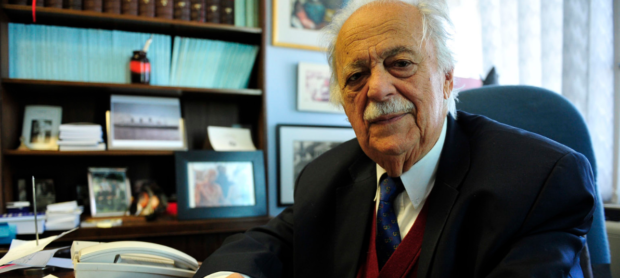
George Bizos
The beginning
But how did a boy born in 1927 in a small Peloponnese village become one of the most renowned lawyers of South Africa and one of the most emblematic personalities of the Greek diaspora?
It all started in 1941, when he left Vassilisi in Messinia in haste with his parents and siblings for the island of Crete. At that time, thirteen-year-old George could not imagine what destiny had in store for him – he was going to make history in a distant foreign land.
Battling against the Aegean rough seas for three days and nights on a fishing boat, they were informed by an allied ship which crossed their path that Crete was occupied by the enemy and thus they changed course to Alexandria. After a three-month stay in Egypt, they ended up in South Africa.
In his new home country, George Bizos discovered that the rights of black people were being brutally violated and consequently decided to become a lawyer in order to defend them. At university, he met Nelson Mandela and immediately forged a deep and sincere friendship which lasted for 65 years. Several years later, they co-wrote the South African Constitution, which is regarded as one of the best in the world with regard to human rights.
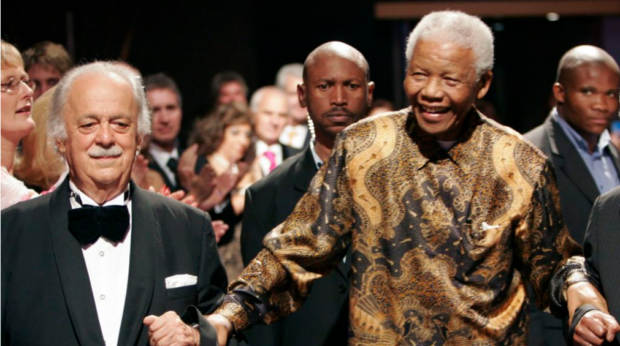
Two giants: the late George Bizos with his friend, the late Nelson Mandela
They first met in 1948 at the Witwatersrand University in Johannesburg. During that period Mandela was concluding his studies in law while George Bizos still had a few years ahead of him.
“He was talking all the time to the students about racial discriminations and I was following him with great interest. Later, he would assign to me cases to defend poor people and he would also involve me in political trials. I did this work for free of charge, although he was a very good lawyer and he was becoming known for his activities. On one occasion during a trial a judge questioned his qualifications and asked for his license, which he did not have on him. As a result, he was not allowed to continue. I took the case to the High Court, asking for the dismissal of the judge on racial discrimination grounds, since Nelson Mandela was a well-known figure. We won the case, and thus our deep and lasting friendship was born,” George Bizos told me during our interview in 2013.
When in 1962 the legendary leader of South Africa was arrested and charged with serious offences, then transferred a few months later to the Robben Island prison in Cape Town, the Greek lawyer took over his defense and became his most frequent visitor.
“He had to choose only one person who would become his and his family’s contact and he chose me. Those were very difficult years for him, but also for me to see him spending long hours breaking rocks down into gravel in a 4 square meter cell,” Bizos told me from the other on the other end of the telephone line.
The release from prison of Madiba (Father of the Nation) in 1990 brought enormous joy to the whole of South Africa, while the name of the tireless Greek lawyer became known to the four corners of the world. After the abolition of apartheid, Bizos contributed to the establishment of the Truth and Reconciliation Committee, whose purpose was to investigate the political crimes of the previous regime.
He continued to fight for justice, freedom and human dignity until last year. His final major legal case resulted in the award of compensation to 34 families of miners who were killed by the police in 2012 during a union demonstration.
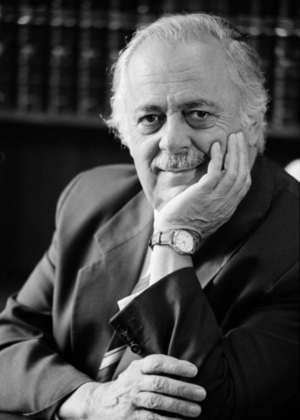
George Bizos
In his autobiography “Odyssey to Freedom”, George Bizos, remembering his arrival in Johannesburg, says that he had no money and only spoke three words of English. “Later I discovered that as a white European migrant, I had more rights than the majority of black South Africans,” he wrote.
In the final chapter of his book, he draws parallels between his life and Kavafi’s poem “Ithaka”. “I realized I was connected with both the country where I was born and the country that adopted me. They both became my “Ithaka”. We shared together their joys and sorrows. I always kept in mind my two “Ithakas”. Perhaps I acquired wisdom, for sure though I got experience. What I can say for certain is that the two “Ithakas” did not fool me”. There is no doubt that George Bizos’ road was a long one, full of adventure, and precious knowledge; a voyage during which he “entered many harbors that he was seeing for the first time”. He encountered several “Laistrygonians” whom he fought with determination, always staying faithful to his vision for a better and more fair world. And if his “Ithakas” have nothing left to give him now, his legacy will remain strong and his name synonymous with freedom.

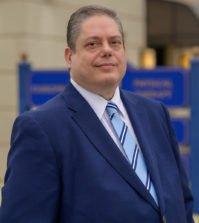
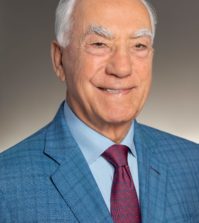
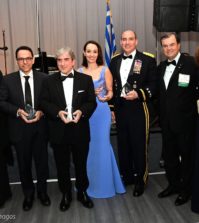
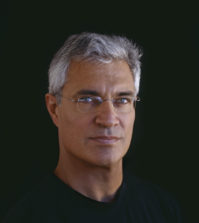










0 comments